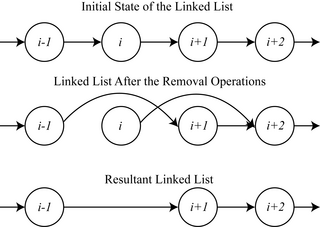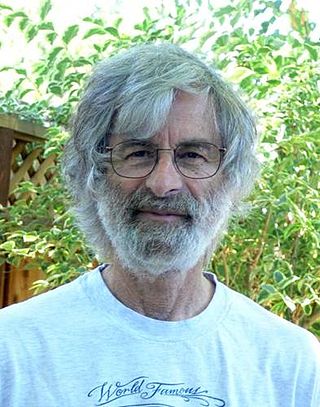Related Research Articles
A distributed system is a system whose components are located on different networked computers, which communicate and coordinate their actions by passing messages to one another. Distributed computing is a field of computer science that studies distributed systems.

In computer science, mutual exclusion is a property of concurrency control, which is instituted for the purpose of preventing race conditions. It is the requirement that one thread of execution never enters a critical section while a concurrent thread of execution is already accessing said critical section, which refers to an interval of time during which a thread of execution accesses a shared resource or shared memory.

In concurrent computing, deadlock is any situation in which no member of some group of entities can proceed because each waits for another member, including itself, to take action, such as sending a message or, more commonly, releasing a lock. Deadlocks are a common problem in multiprocessing systems, parallel computing, and distributed systems, because in these contexts systems often use software or hardware locks to arbitrate shared resources and implement process synchronization.

Leslie B. Lamport is an American computer scientist and mathematician. Lamport is best known for his seminal work in distributed systems, and as the initial developer of the document preparation system LaTeX and the author of its first manual.

In computer science, concurrency is the ability of different parts or units of a program, algorithm, or problem to be executed out-of-order or in partial order, without affecting the outcome. This allows for parallel execution of the concurrent units, which can significantly improve overall speed of the execution in multi-processor and multi-core systems. In more technical terms, concurrency refers to the decomposability of a program, algorithm, or problem into order-independent or partially-ordered components or units of computation.
A Byzantine fault is a condition of a computer system, particularly distributed computing systems, where components may fail and there is imperfect information on whether a component has failed. The term takes its name from an allegory, the "Byzantine generals problem", developed to describe a situation in which, in order to avoid catastrophic failure of the system, the system's actors must agree on a concerted strategy, but some of these actors are unreliable.
In computing, a parallel programming model is an abstraction of parallel computer architecture, with which it is convenient to express algorithms and their composition in programs. The value of a programming model can be judged on its generality: how well a range of different problems can be expressed for a variety of different architectures, and its performance: how efficiently the compiled programs can execute. The implementation of a parallel programming model can take the form of a library invoked from a sequential language, as an extension to an existing language, or as an entirely new language.
Nancy Ann Lynch is a computer scientist affiliated with the Massachusetts Institute of Technology. She is the NEC Professor of Software Science and Engineering in the EECS department and heads the "Theory of Distributed Systems" research group at MIT's Computer Science and Artificial Intelligence Laboratory.
Concurrent computing is a form of computing in which several computations are executed concurrently—during overlapping time periods—instead of sequentially—with one completing before the next starts.
Causal consistency is one of the major memory consistency models. In concurrent programming, where concurrent processes are accessing a shared memory, a consistency model restricts which accesses are legal. This is useful for defining correct data structures in distributed shared memory or distributed transactions.
A fundamental problem in distributed computing and multi-agent systems is to achieve overall system reliability in the presence of a number of faulty processes. This often requires coordinating processes to reach consensus, or agree on some data value that is needed during computation. Example applications of consensus include agreeing on what transactions to commit to a database in which order, state machine replication, and atomic broadcasts. Real-world applications often requiring consensus include cloud computing, clock synchronization, PageRank, opinion formation, smart power grids, state estimation, control of UAVs, load balancing, blockchain, and others.
Paxos is a family of protocols for solving consensus in a network of unreliable or fallible processors. Consensus is the process of agreeing on one result among a group of participants. This problem becomes difficult when the participants or their communications may experience failures.
In fault-tolerant distributed computing, an atomic broadcast or total order broadcast is a broadcast where all correct processes in a system of multiple processes receive the same set of messages in the same order; that is, the same sequence of messages. The broadcast is termed "atomic" because it either eventually completes correctly at all participants, or all participants abort without side effects. Atomic broadcasts are an important distributed computing primitive.
The Brooks–Iyengar algorithm or FuseCPA Algorithm or Brooks–Iyengar hybrid algorithm is a distributed algorithm that improves both the precision and accuracy of the interval measurements taken by a distributed sensor network, even in the presence of faulty sensors. The sensor network does this by exchanging the measured value and accuracy value at every node with every other node, and computes the accuracy range and a measured value for the whole network from all of the values collected. Even if some of the data from some of the sensors is faulty, the sensor network will not malfunction. The algorithm is fault-tolerant and distributed. It could also be used as a sensor fusion method. The precision and accuracy bound of this algorithm have been proved in 2016.
Baruch Awerbuch is an Israeli-American computer scientist and a professor of computer science at Johns Hopkins University. He is known for his research on distributed computing.
Daniel (Danny) Dolev is an Israeli computer scientist known for his research in cryptography and distributed computing. He holds the Berthold Badler Chair in Computer Science at the Hebrew University of Jerusalem and is a member of the scientific council of the European Research Council.
In distributed computing, a conflict-free replicated data type (CRDT) is a data structure that is replicated across multiple computers in a network, with the following features:
- The application can update any replica independently, concurrently and without coordinating with other replicas.
- An algorithm automatically resolves any inconsistencies that might occur.
- Although replicas may have different state at any particular point in time, they are guaranteed to eventually converge.

Jayadev Misra is an Indian-born computer scientist who has spent most of his professional career in the United States. He is the Schlumberger Centennial Chair Emeritus in computer science and a University Distinguished Teaching Professor Emeritus at the University of Texas at Austin. Professionally he is known for his contributions to the formal aspects of concurrent programming and for jointly spearheading, with Sir Tony Hoare, the project on Verified Software Initiative (VSI).
Rachid Guerraoui is a Moroccan-Swiss computer scientist and a professor at the School of Computer and Communication Sciences at École Polytechnique Fédérale de Lausanne (EPFL), known for his contributions in the fields of concurrent and distributed computing. He is an ACM Fellow and the Chair in Informatics and Computational Science for the year 2018–2019 at Collège de France for distributed computing.

Sergio Rajsbaum is a Mexican computer scientist, working in the field of Theoretical Computer Science, specifically concurrent and distributed computing.
References
- ↑ Michel Raynal's personal page on IRISA's website
- ↑ "Home".
- ↑ "Synthesis Lectures on Distributed Computing Theory".
- ↑ Michel Raynal's bibliography on DBLP
- ↑ Michel Raynal's bibliography on Google Scholar
- ↑ Raynal, Michel (2012). Concurrent Programming: Algorithms, Principles, and Foundations. Springer. doi:10.1007/978-3-642-32027-9. ISBN 978-3-642-32027-9. S2CID 10526009.
- ↑ Raynal, Michel (2013). Distributed algorithms for message-passing systems. Berlin, Heidelberg: Springer. doi:10.1007/978-3-642-38123-2. ISBN 978-3-642-38123-2. S2CID 31644113.
- ↑ Raynal, Michel (2018). Fault-tolerant message-passing distributed systems: an algorithmic approach. Springer. doi:10.1007/978-3-319-94141-7. ISBN 978-3-319-94141-7. S2CID 52175582.
- ↑ Le Bonheur, Julien (2018-07-16). "Michel Raynal distingué pour sa contribution exceptionnelle à l'algorithmique répartie" (in French). Université de Rennes 1. Retrieved 13 January 2020.
- ↑ "International Workshop on Distributed Computing in the honor of Michel Raynal". Inria. Retrieved 21 December 2019.
- ↑ Raynal, Michel (1986) [1984]. Algorithms for mutual exclusion. Cambridge: MIT Press. ISBN 0-262-18119-3.
- ↑ Hélary, Jean-Michel; Mostéfaoui, Achour; Raynal, Michel (November 1994). "A general scheme for token- and tree-based distributed mutual exclusion algorithms" (PDF). IEEE Transactions on Parallel and Distributed Systems. 5 (11): 1185–1196. doi:10.1109/71.329670. ISSN 2161-9883.
- ↑ Raynal, Michel; Schiper, André; Toueg, Sam (September 1991). "The causal ordering abstraction and a simple way to implement it" (PDF). Information Processing Letters. 39 (6): 343–350. doi:10.1016/0020-0190(91)90008-6.
- ↑ Baldoni, Roberto; Hélary, Jean-Michel; Raynal, Michel (March 2001). "Rollback-Dependency Trackability: A Minimal Characterization and Its Protocol". Information and Computation. 165 (2): 144–173. doi: 10.1006/inco.2000.2906 .
- ↑ Hélary, J.-M.; Mostefaoui, A.; Netzer, R.H.B.; Raynal, M. (1 January 2000). "Communication-based prevention of useless checkpoints in distributed computations". Distributed Computing. 13 (1): 29–43. doi:10.1007/s004460050003. S2CID 6554750.
- ↑ Helary, J.; Mostefaoui, A.; Raynal, M. (1999). "Communication-induced determination of consistent snapshots". IEEE Transactions on Parallel and Distributed Systems. 10 (9): 865–877. doi:10.1109/71.798312. S2CID 13939609.
- ↑ Hélary, J.M.; Mostefaoui, A.; Raynal, M. (March 2002). "Interval Consistency of Asynchronous Distributed Computations". Journal of Computer and System Sciences. 64 (2): 329–349. doi: 10.1006/jcss.2001.1819 .
- ↑ GARG, VIJAY K.; RAYNAL, MICHEL (21 November 2011). "Normality: A CONSISTENCY CONDITION FOR CONCURRENT OBJECTS". Parallel Processing Letters. 09 (1): 123–134. doi:10.1142/S0129626499000141. S2CID 16427772.
- ↑ MOSTEFAOUI, A.; RAYNAL, M. (21 November 2011). "Leader-Based Consensus". Parallel Processing Letters. 11 (1): 95–107. doi:10.1142/S0129626401000452.
- ↑ Guerraoui, R.; Raynal, M. (16 October 2006). "The Alpha of Indulgent Consensus" (PDF). The Computer Journal. 50 (1): 53–67. doi:10.1093/comjnl/bxl046.
- ↑ Mostefaoui, Achour; Rajsbaum, Sergio; Raynal, Michel; Travers, Corentin (January 2008). "The Combined Power of Conditions and Information on Failures to Solve Asynchronous Set Agreement". SIAM Journal on Computing. 38 (4): 1574–1601. doi:10.1137/050645580. S2CID 12886589.
- ↑ Mostéfaoui, Achour; Moumen, Hamouma; Raynal, Michel (11 September 2015). "Signature-Free Asynchronous Binary Byzantine Consensus with t < n/3, O(n2) Messages, and O(1) Expected Time" (PDF). Journal of the ACM. 62 (4): 1–21. doi:10.1145/2785953. S2CID 2212421.
- ↑ Mostefaoui, Achour; Rajsbaum, Sergio; Raynal, Michel (1 November 2003). "Conditions on input vectors for consensus solvability in asynchronous distributed systems". Journal of the ACM. 50 (6): 922–954. doi:10.1145/950620.950624.
- ↑ Friedman, Roy; Mostefaoui, Achour; Rajsbaum, Sergio; Raynal, Michel (July 2007). "Asynchronous Agreement and Its Relation with Error-Correcting Codes". IEEE Transactions on Computers. 56 (7): 865–875. doi:10.1109/TC.2007.1043. S2CID 9418243.
- ↑ Castañeda, Armando; Rajsbaum, Sergio; Raynal, Michel (19 November 2018). "Unifying Concurrent Objects and Distributed Tasks". Journal of the ACM. 65 (6): 1–42. doi:10.1145/3266457. S2CID 53877441.
- ↑ Raynal, Michel; Stainer, Julien; Taubenfeld, Gadi (19 August 2015). "Distributed Universality". Algorithmica. 76 (2): 502–535. doi:10.1007/s00453-015-0053-3. S2CID 10912125.
- ↑ Raynal, Michel; Taubenfeld, Gadi (2019). "Mutual exclusion in fully anonymous shared memory systems".
{{cite journal}}: Cite journal requires|journal=(help) - ↑ Michel Raynal's page Archived 2015-01-11 at the Wayback Machine on the website of the Institut Universitaire de France
- ↑ "SIROCCO 2015 website". Archived from the original on 2015-11-27. Retrieved 2015-03-10.
- ↑ Michel Raynal's page on the website of Academia Europaea
- ↑ "Michel Raynal distingué pour sa contribution exceptionnelle à l'algorithme répartie". Université de Rennes 1. July 2018.
- ↑ Le Bonheur, Julien (16 July 2018). "Michel Raynal distingué pour sa contribution exceptionnelle à l'algorithmique répartie" (in French). Université de Rennes 1. Retrieved 13 January 2020.